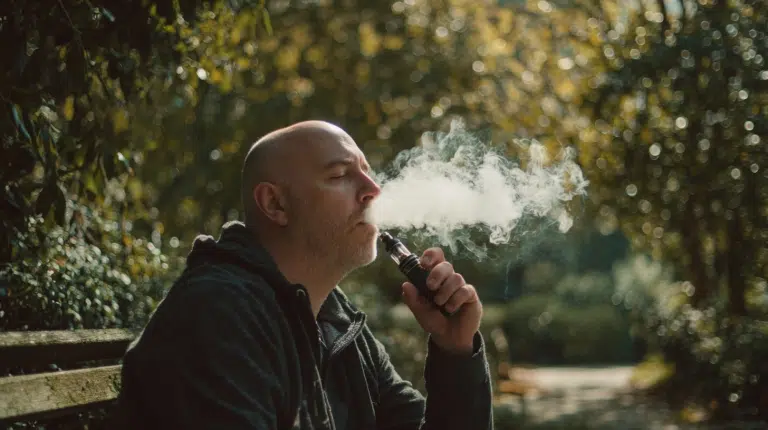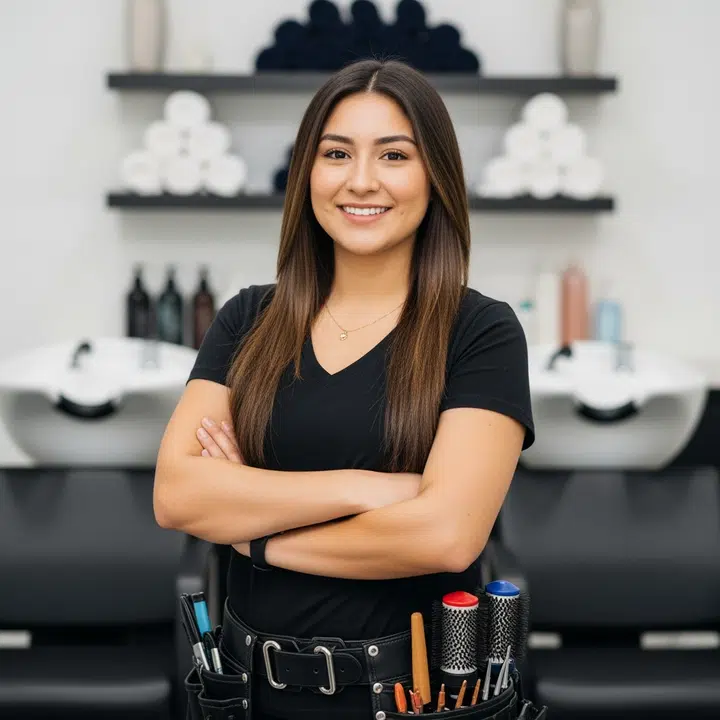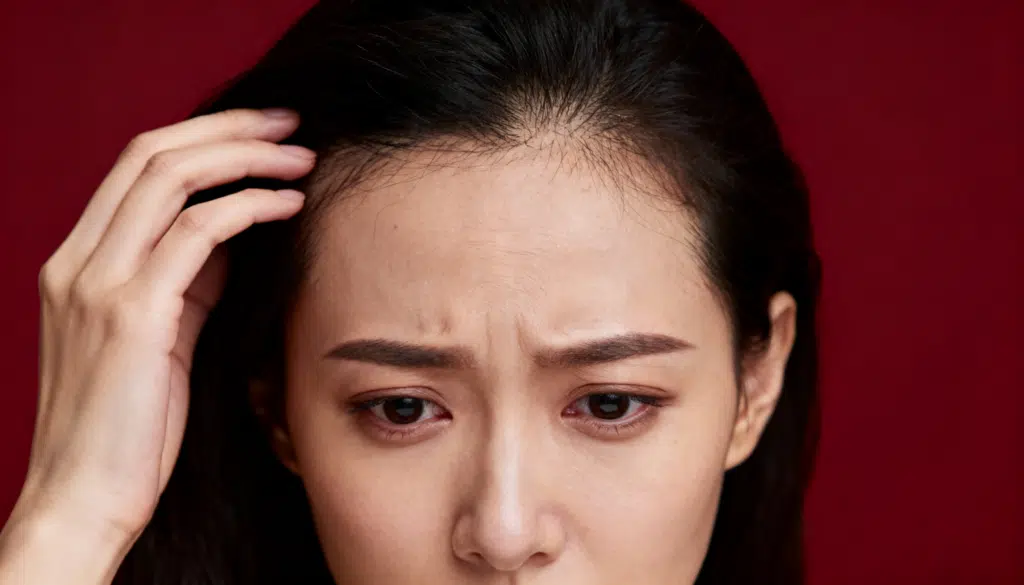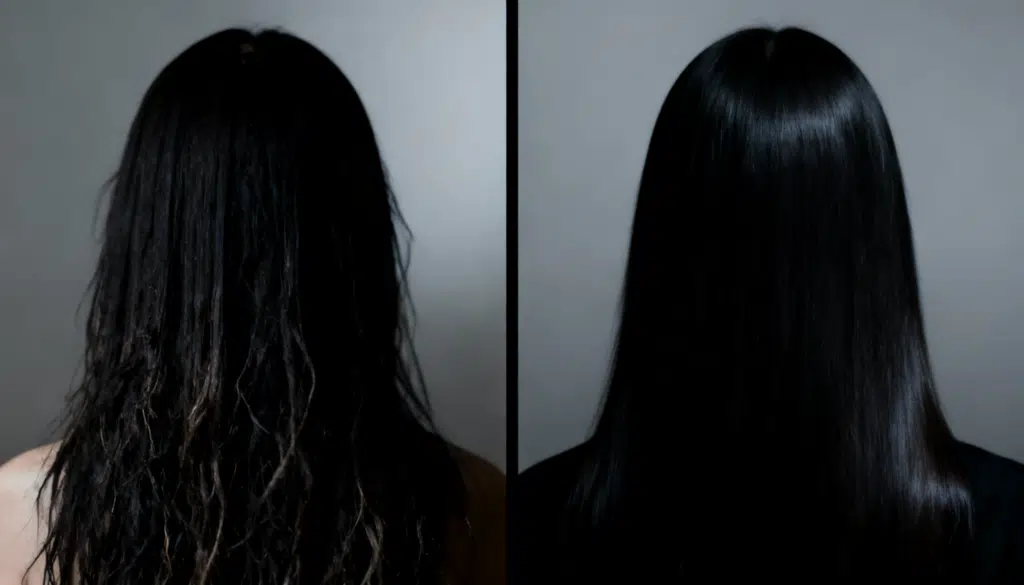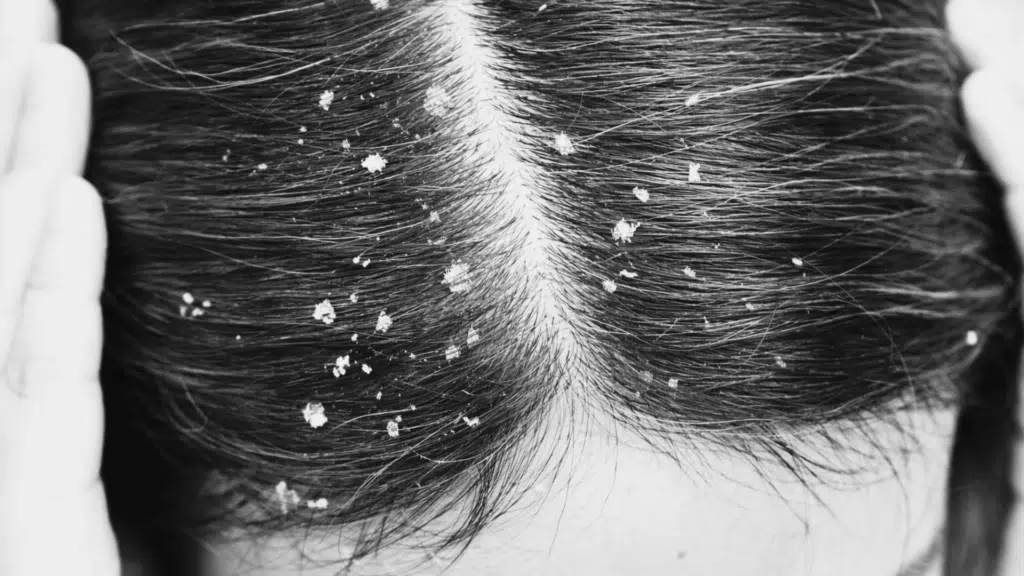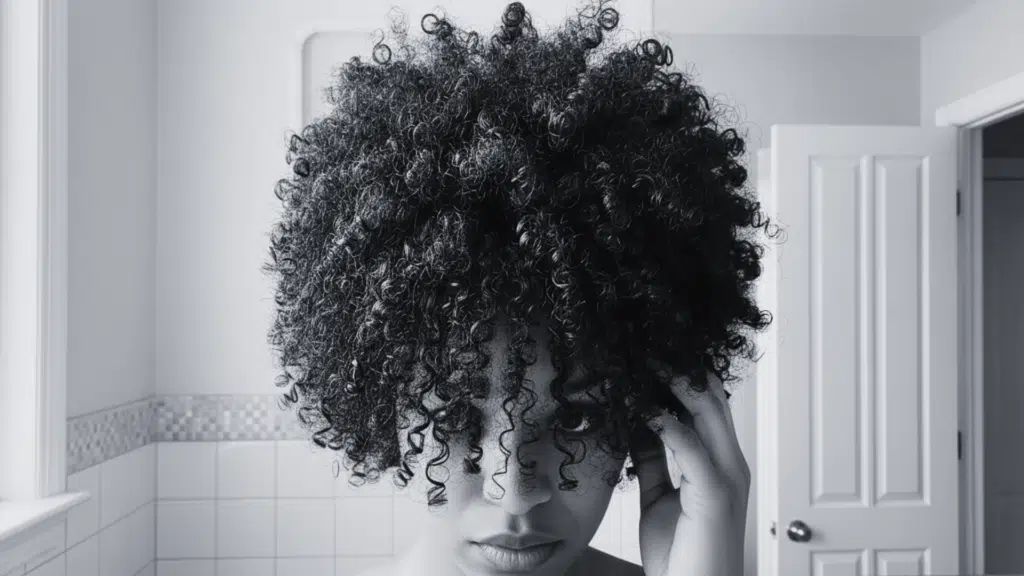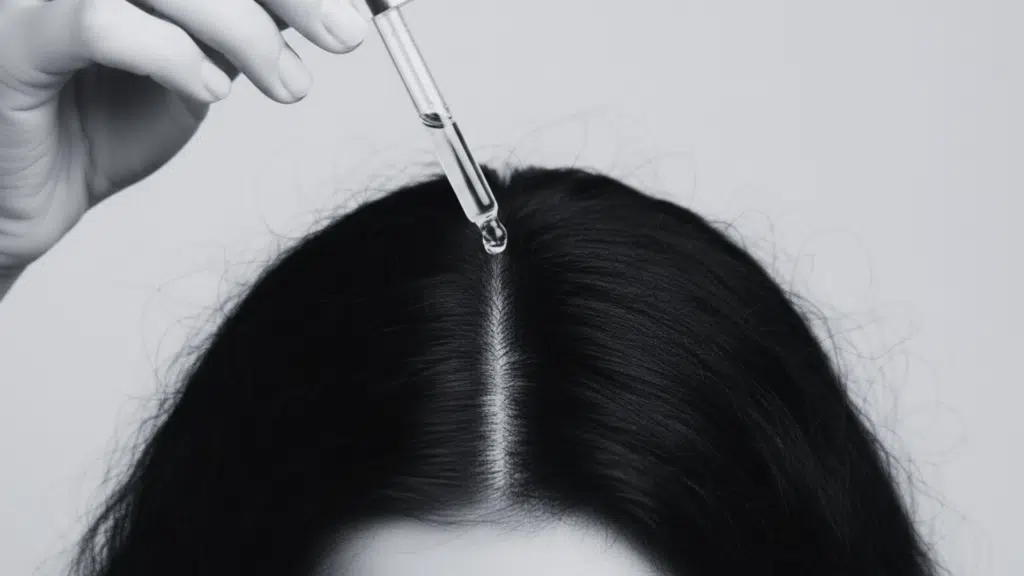So you’re puffing on your vape, feeling pretty good about ditching cigarettes. But wait, is that more hair in your shower drain than usual?
One day, you’re congratulating yourself for making a healthier choice, and the next, you’re staring at your reflection, wondering if your hairline is playing hide and seek. It’s enough to make anyone paranoid!
The thing is, lots of people are asking this same question: Can vaping cause hair loss? Let’s dig into this hair situation and see what’s actually going on up there.
Is Vaping as Bad as Smoking for Hair – Health Risks of Vaping?
Think vaping is the lesser evil? Well, it’s complicated. While vaping might not be as harsh as traditional cigarettes, it still comes with its own bag of tricks that can mess with your hair health.
Vaping delivers nicotine to your system, which restricts blood flow to your hair follicles. When your follicles don’t get proper nourishment, they start to weaken.
The chemicals in vape juice, such as propylene glycol, can cause systemic inflammation that affects your hair growth cycle.
Here’s the kicker: many people vape to manage stress, but nicotine addiction actually creates a stress cycle. Your body craves regular nicotine hits, and when it doesn’t get them, stress hormones spike.
High stress levels are known culprits for triggering hair loss conditions. Thus, the answer to ‘ can vaping cause hair loss ‘ is yes, it can.
The Science Behind Vaping Causing Hair Fall
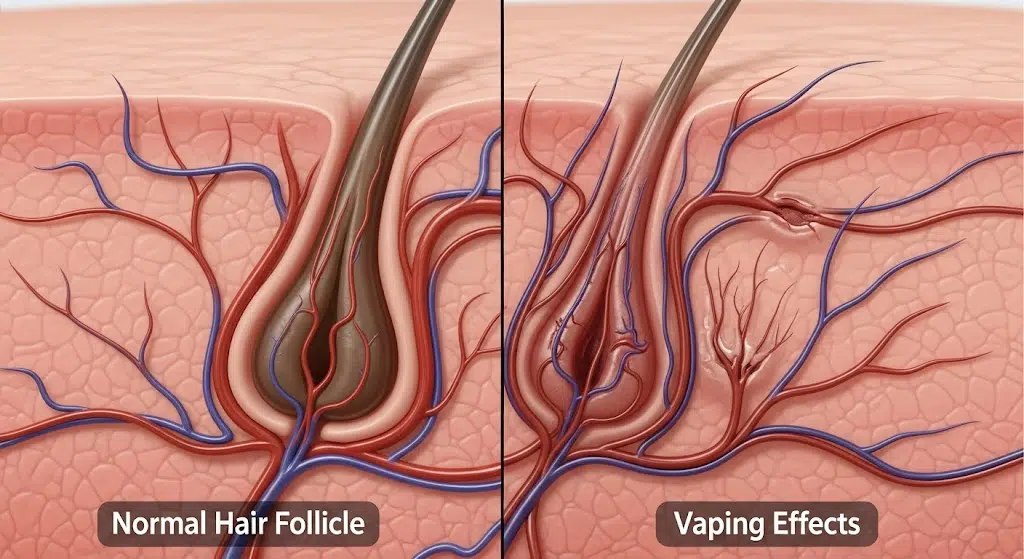
Here’s what actually happens when you vape and how it can affect your hair. The science behind the question ‘ does vaping cause hair loss ‘ isn’t pretty, but it’s crucial to understand what’s happening inside your body.
Nicotine Constricts Blood Vessels
Can nicotine cause hair loss? Yes, when you inhale nicotine, it travels through your bloodstream and causes your blood vessels to narrow. This means less blood reaches your scalp and hair follicles.
Think of it like trying to water a garden with a kinked hose: not much gets through.
Hormone Disruption
Vaping can mess with your hormone levels, particularly DHT (dihydrotestosterone). Higher DHT levels can shrink hair follicles, making hair thinner and more likely to fall out.
This is the same hormone responsible for male pattern baldness.
Oxidative Stress
The chemicals in vape juice can increase oxidative stress in your body. This damages cells, including those in your hair follicles. When follicle cells are damaged, they can’t produce healthy hair strands.
Inflammation Response
Your immune system sees vaping chemicals as foreign invaders and triggers inflammation. Chronic inflammation can disrupt the hair growth cycle, pushing more follicles into the resting phase where they stop producing hair.
How to Reduce Hair Fall Caused by Vaping
Ready to give your hair some love while you figure out your vaping situation? Here are some practical steps that can help minimize the damage.
- Improve your diet: Load up on iron, zinc, and B vitamins. These nutrients help counteract some of the damage from reduced blood flow.
- Stay hydrated: Drink plenty of water to help flush toxins from your system and keep your scalp healthy.
- Use gentle hair products: Switch to sulfate-free shampoos and avoid harsh styling tools that can stress already weakened hair.
- Massage your scalp: Regular scalp massage can boost blood circulation and help compensate for nicotine’s blood vessel constriction.
- Take supplements: Biotin, collagen, and omega-3 supplements can support hair health from the inside out.
- Reduce vaping frequency: If you can’t quit completely, try to space out your vaping sessions to give your body breaks from nicotine exposure.
- Manage stress: Find other ways to cope with stress besides vaping, like exercise or meditation.
Hair Replacement Treatment for Hair Loss
So your hair has already packed its bags and left the building? Don’t panic. There are plenty of options to help you get back in the game.
From high-tech procedures to simple topical treatments, given below is your access to the world of hair restoration. Some work better than others, and your wallet will definitely have opinions about your choices.
| Treatment Type | How It Works | Time to See Results | Cost Range | Effectiveness |
|---|---|---|---|---|
| Hair Transplant | Moves healthy follicles to thinning areas | 6-12 months | $4,000-$15,000 | High |
| Minoxidil | Topical treatment that stimulates growth | 3-6 months | $20-$60/month | Moderate |
| Finasteride | A prescription pill that blocks DHT | 3-6 months | $10-$80/month | High |
| PRP Therapy | Uses your own blood to stimulate follicles | 3-4 months | $500-$1,500 per session | Moderate |
| Hair Systems | Wigs or hairpieces | Immediate | $200-$3,000 | Cosmetic only |
| Laser Therapy | Low-level light stimulates follicles | 4-6 months | $2,000-$4,000 | Low to moderate |
The key is finding what works for your budget and lifestyle. Some treatments require ongoing commitment, while others are one-time deals.
Talk to a hair specialist or dermatologist to figure out which option makes the most sense for your specific situation.
Will Your Hair Grow Back if You Quit Vaping?
Yes, your hair can grow back if you quit vaping! But here’s the real talk about what to expect.
The Recovery Timeline
Most people start seeing improvements within 3-6 months after quitting. Full recovery typically takes 6-12 months, sometimes longer. Your hair follicles need time to heal from the nicotine damage and get back to their normal growth cycle.
What Affects Your Recovery
Several factors influence how well your hair bounces back:
- How long you vaped: The longer you used nicotine, the more time your hair needs to recover
- Your overall health: Good nutrition, exercise, and sleep speed up the process
- Genetics: Some people naturally recover faster than others
- Age: Younger people tend to see quicker improvements
- Other hair loss causes: If you have genetic hair loss too, recovery might be limited
What to Expect
Don’t expect your hair to magically reappear overnight. You might notice less hair falling out first, then see new growth starting as tiny, fine hairs. These gradually get thicker and stronger over time.
Some people see significant improvement, while others might only get partial recovery. The key is that quitting vaping stops further damage and gives your hair the best chance to heal itself.
Quitting vaping is always worth it for your hair and overall health, even if the recovery isn’t 100% perfect.
How to Quit Vaping for Good

Found the answer to: Can vaping cause hair loss? and want to change your ways? Quitting vaping isn’t just about saving your hair; it’s about getting your whole life back.
Here’s a realistic approach that actually works for real people.
Start with a Plan: Don’t just wing it. Pick a quit date and prepare for it. Tell friends and family so they can support you. Remove vaping supplies from your house, car, and workspace.
Handle the Nicotine Withdrawal: The first few days are rough. Expect mood swings, cravings, and irritability. Keep your hands busy with stress balls or fidget toys. Drink lots of water and get moving with short walks.
Replace the Habit: Vaping becomes a routine. You need to replace that routine with something else. Try chewing gum, sipping herbal tea, or doing deep breathing exercises when cravings hit.
Get Professional Help: Consider nicotine replacement therapy, such as patches or gum. Some people benefit from prescription medications that reduce cravings. Talk to your doctor about what might work for you.
Stay Motivated: Keep a list of reasons why you want to quit. Take photos of your hair progress. Calculate how much money you’re saving. Celebrate small wins along the way.
Factors to Remember While Decoding Vaping and Hair Loss
Here are some important points to remember as you deal with the question: Can vaping cause hair loss?
- Hair loss takes time: You won’t notice changes overnight. It usually takes months of regular vaping to see significant hair loss.
- Everyone’s different: Your genetics, health, and vaping habits determine how much your hair is affected.
- Multiple causes exist: Vaping might worsen existing hair loss rather than being the only cause.
- See a doctor for sudden loss: Rapid or severe hair loss could signal other health issues.
- Recovery is possible: Many people see hair improvements within 6-12 months after quitting.
- Patience is key: Just like the damage took time, so does healing.
Conclusion
So, can vaping cause hair loss? The answer is yes, but it’s not a simple yes or no situation. While vaping might seem like a safer alternative to smoking, it still introduces nicotine and other chemicals into your body that can mess with your hair health.
You’re not stuck with whatever damage has been done. Your body has an incredible ability to heal itself when you give it the chance.
Choose to quit vaping completely or just reduce your usage; your hair can recover with the right care and patience.
Healthy hair is just one piece of the puzzle. Taking care of your overall health will benefit not just your hair, but your entire well-being. And honestly, isn’t that worth more than any vaping habit?



